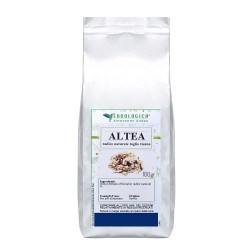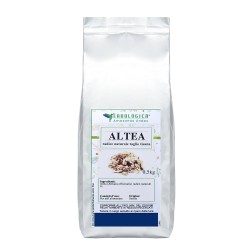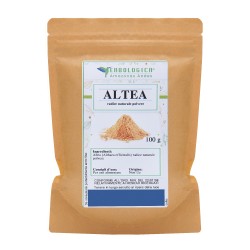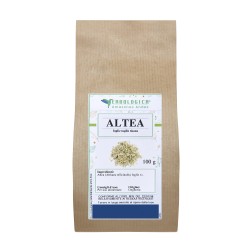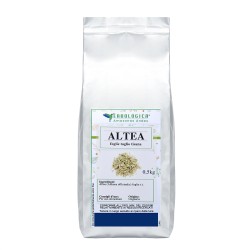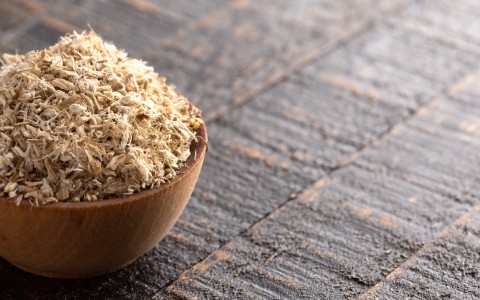
La radice di altea ha una lunga storia di utilizzo come erba medicinale.
Per secoli è stata utilizzata per lenire il mal di gola, facilitare la digestione e trattare le condizioni della pelle.
Questa pianta versatile ha una varietà di proprietà medicinali che la rendono un'aggiunta preziosa a qualsiasi regime di salute naturale.
Dal trattamento delle infiammazioni alla protezione del fegato, la radice di altea può offrire una serie di benefici per la salute. Inoltre, è considerata un rimedio naturale sicuro e con pochi effetti collaterali.
In questo articolo esploreremo le proprietà della radice di altea e discuteremo alcuni dei modi in cui può essere utilizzata per migliorare la salute.
Altea radice caratteristiche
La pianta dell'altea ha una lunga storia di utilizzo come erba medicinale.
È stata usata per lenire il mal di gola, facilitare la digestione e trattare le condizioni della pelle.
È stato dimostrato che la radice di altea ha numerosi benefici per la salute, il che la rende un'eccellente erba medicinale.
La radice della pianta di marshmallow è la parte utilizzata a livello medico.
Si tratta di una pianta alta e fiorita della famiglia delle radici. La radice di altea è comunemente usata come rimedio erboristico per varie patologie.
A volte viene utilizzata anche come trattamento alternativo per allergie, tosse, dolori muscolari e problemi digestivi.
La radice contiene una mucillagine naturale che la rende particolarmente utile per alleviare la tosse e lenire i tessuti irritati.
La radice di altea è una delle erbe più popolari per il trattamento dei problemi digestivi.
È stato dimostrato che riduce il gonfiore dello stomaco e dell'intestino, il che la rende particolarmente utile per le persone affette da sindrome dell'intestino irritabile.
Proprietà e benefici della radice di altea
Proprietà antinfiammatorie
La ricerca ha dimostrato che la radice di altea ha proprietà antinfiammatorie.
Agisce per ridurre l'infiammazione inibendo gli enzimi che la causano.
Sembra avere anche proprietà antiossidanti che possono contribuire a ridurre l'infiammazione. Inoltre, può essere applicato topicamente come pomata lenitiva per le infiammazioni della pelle.
Proprietà antiossidanti
Gli antiossidanti contenuti nella radice di altea possono contribuire a proteggere l'organismo dallo stress ossidativo.
Lo stress ossidativo si verifica quando c'è uno squilibrio tra la produzione di radicali liberi e la capacità dell'organismo di neutralizzarli.
Di conseguenza, le cellule e i tessuti dell'organismo possono essere danneggiati.
Gli antiossidanti, come quelli presenti nella radice di altea, possono aiutare a proteggere da questi danni.
Sostegno alla digestione
La radice di altea ha dimostrato di possedere proprietà antinfiammatorie.
Agisce per ridurre l'infiammazione inibendo gli enzimi che la causano.
Sembra che abbia anche proprietà antiossidanti che possono contribuire a ridurre l'infiammazione.
Inoltre, può essere applicata topicamente come pomata lenitiva per le infiammazioni della pelle.
Protezione del fegato
Le proprietà antiossidanti della radice di altea possono anche aiutare a proteggere il fegato dai danni.
Il fegato è l'organo responsabile del filtraggio delle tossine dall'organismo.
L'esposizione prolungata alle tossine può danneggiare il fegato.
Gli antiossidanti contenuti nella radice di altea possono aiutare a proteggere il fegato da questi danni.
Cura della pelle
Le proprietà antinfiammatorie della radice di altea possono essere applicate anche a livello topico per trattare le infiammazioni della pelle.
Può essere utilizzata per trattare condizioni della pelle come la psoriasi e l'eczema.
Conclusioni
I benefici della radice di altea sono molteplici e possono essere utilizzati in vari modi.
Questa radice è un'utile aggiunta a qualsiasi regime di salute naturale e può essere utilizzata per trattare una varietà di condizioni.
Dal trattamento del mal di gola alla protezione del fegato, la radice di altea può offrire una serie di benefici per la salute.
Inoltre, è considerata un rimedio naturale sicuro con pochi effetti collaterali.
Se siete interessati a utilizzare la radice di altea, iniziate a consumarla sotto forma di tè o tinture.
È anche possibile applicarla topicamente come pomata per le condizioni della pelle.


